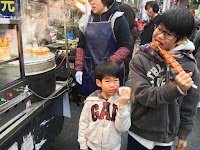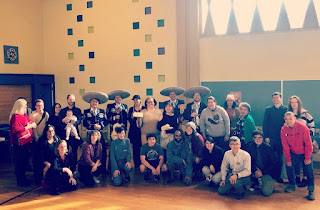Sermon: Between the two worlds
Text: 1 Corinthians 3:1-9
In today’s reading, the Apostle Paul says, “For we are God’s servants, working together; you are God’s field, God’s building… So neither the one who plants nor the one who waters is anything, but only God who gives the growth.”
I came back! Yay! I went to Korea with my two boys for a holiday, two days after Christmas, and came back to ‘Winterpeg' just last Sunday. Many of you warmly welcomed me back by saying, “Welcome back to winter - It was cold, here.” Well, it’s also winter in Korea, and it can be cold! Even though it would never be as frost-bitingly cold as here – I can tell you that the best thing about winter in Korea is that you just need to put on your jacket and leave your apartment any time you want to buy and enjoy delicious hot snacks for just 2 dollars at street vendors. They are everywhere.
Wow… I still miss that. Kids love it. It’s cheap, yummy, and it makes you warm right away. We liked to act like tourists, enjoying new places, new food, new Korean trends.
For me, however, visiting Korea has never been just a tour. It has been, as you can imagine, like moving between two worlds: between the world which is like my mother’s milk and the world which I have adopted and chosen – borrowing an image from today’s reading: like solid food. Korea is the world where I didn’t fit in; Canada is the world in which I try to fit in.
During my holiday in Korea, I was very excited for a ‘reunion’ with my high school girlfriends. In our conversation, I was surprised to hear my friends unanimously telling me that I was a very, very different kind of kid: ‘Smart but unusual.’ One of them, my best friend who I really liked, told me one story for the first time: her mother was told by our 11th grade teacher to separate my friend and I because we were too close and my character was too ‘advanced.’ Part of the reason for the proposed separation is that, in the Korean education system, we should be exclusively focused on studying (in order to enter a high-ranking university). And also, the culture is homophobic – intense friendships are looked upon with a certain amount of suspicion.
Korea is my ‘mother’s milk’ home. I treasure my tradition, language, and relationships so much. However, I remember why I left Korea. I knew I would be worn down by the restrictions of patriarchy, sexism and the culture of standardization. I was like a fish out of water. Borrowing the earlier image from the reading again, I was ready for solid food - freedom, hard to achieve but worth the adventure.
We say that this country, Canada, should make greater efforts to build a culture that promotes, respects and celebrates diversity. We believe every person should be treated equally and with understanding, respect and kindness, without judgement or discrimination, regardless of their differences and social attributes. No matter what race, gender, migration experience, sexual orientation, economic background – we all belong. To tell the truth, while I was in Korea during my last visit, I sharply realized how I had benefitted and enjoyed the result of the hard work of all the people who built this culture of diversity. Of course, Canada is still not immune to racism, sexism, patriarchy, and gender normativity. However, despite the long road ahead of us if we wish to achieve total social equity in all matters, Canada has advanced the culture of diversity and understanding. Korea has a much longer, rougher road ahead. The idea of respecting differences hardly enters anyone’s mind. To survive in the Korean economy, everyone studies hard and works hard – they’re killing themselves. The society presses people into a race for a single success - wealth and power - then judges those who have achieved less. To climb up the ladder of success through jobs or marriage, everyone should look the same, behave the same, achieve the same.
I’ll tell you two funny examples: when you visit an eyewear shop in Korea, you will shortly notice that there is no diversity in the eyeglasses on display. If one style is trendy (show the example), everyone wears it.
Another example: even though I found some exceptions in Seoul, the fashionable capital city of Korea – in my home town, I saw no young women with short hair while I was there for the last forty days of my holiday. Because of that, people immediately make a judgment without any second thought that if you have short hair you are a man. So when this ‘uncategorizable’ woman went into a shoe store, the staff came to me and said, “We have a women’s section and a men’s section - this is the women’s section.” They repeated themselves, thinking that I must be confused. When I told my Canadian friends about this, one of them joked, “Anyone who confuses you for a male needs new eyeglasses!”
I became very stressed. Especially by my own Korean friend’s unthoughtful comments – they called me, “Daddy Hana.” They didn’t mean to hurt my feelings, but they did. Then a short talk with my mom gave me an incredibly wonderful lesson. If you meet my mom, you can immediately notice that she loves me. She loves me. However, when I was young, even though she’s the best friend in the world, I felt unsure about whether her love for me was really unconditional. I had suspicions. I wanted to know her love was really free of conditions, such as which University I could enter, my hetero -sexuality, my jobs, my success, my expression of femininity/masculinity. Perhaps because I was afraid to know the truth, I didn’t normally initiate honest conversations with my mom, even though we are so close. This last trip, at an eyewear shop (I had a mission to buy two pairs of eyeglasses for my husband and me), I was lost in the minutiae of discerning the difference between hundreds of round-shaped eyeglasses, and, having a difficult time making a decision, I asked her, “To your eyes, don’t I really look weird in these glasses? Don’t I look like a man or Harry Potter if I wear them?” My mom looked me in the eyes with such trust, certainty and love, (she’s now more educated and wants to know my world) and seriously and genuinely answered to me, “I think you are great. I really like your style. You are fine.”
Her words really deeply touched my heart. I learned that no matter what others would say to you or how they would treat you, a parent’s trust and unconditional love is all that you need. I learned a lesson that marriage, career, jobs - these ‘conditions’ can’t make or break who you are. What is really important for growth and confidence is to know that you are loved, you belong, you are known to your Creator God as you are. No matter what others say and how they treat you or judge you – knowing what unconditional love is like and experiencing that love being given without being asked, fills your heart. It is an amazing experience and the greatest gift. The recognition, discovery, acceptance and welcome of that love, the love that “Only God can give” (We see this love in the mirror of a parent’s love) enables growth. Anxiety, attachment, immaturity give way to finding the true peace of security, certainty and faith.
“So neither the one who plants nor the one who waters is anything, but only God who gives the growth” Our faith journey is about the pilgrimage of discovering, knowing and welcoming love: knowing that “I am God’s field, I am God’s building.” Our eyes meet the Creator’s shining eyes of love that look so steadily upon our being; ‘conditions’ have no place in God’s vision.
Geographical location can be the ‘conditions.’ Regardless of where I live - either in Canada or in Korea - I will struggle with the conditions on which my life is based. In Canada, I benefit from the advanced culture of diversity and a better status for women. But at the same time, the stress that follows having a language barrier will never leave me as long as I live and work in the English-speaking world. I have benefits, I have challenges. Many new Canadians have sought a haven of safety in Canada in times of war, violence, and disaster. They come with hope, but soon face a lot of challenges: income stress and isolation, not to mention hate crimes or hostility against their faith.
The fact that we live with these conditions will not change. We all move between two worlds or multiple different worlds. We try to fit into the different conditions of certain worlds of ours - at home, at workplace, at church. You are a father, a husband, an aunt, a colleague. You have to prove yourself. You know the standard; you know the boundaries. We don’t need a passport to move between these worlds. But faith is a different kind of journey: We travel between worlds to find the truth and know by experience that ‘You can love yourself vehemently and fervently in the same way that God vehemently and fervently loves you.’ In this love, there are no conditions. Imagine. You lie down on the sandy shore of the great Pacific Ocean, under the fullness of sunshine. Everything is shiny and blue. You look up and find the God who watches the entire earth with shining eyes of love - no conditions - God’s love is for the entire earth and everyone, including us.
I am very happy that our Outreach committee has invited Maysoun Darweesh from Welcome Place to talk with us about how we can support refugees (You know that we all are immigrants if you are not First Nations.) as they adapt to life in Winnipeg. Refugees coming to Canada doesn’t just mean that we become the ‘providers.’ It means that members of the two different worlds warmly welcome each other.
I welcome Maysoun Darweesh, here. “For we are God’s servants, working together,” “God’s field, God’s building.” Welcome.
I think what I was trying to say is that conditions are conditions. 'conditions' are changing. Nothing is permanent. Everything is changing as Buddha says. Yet, God's love doesn't change, and the reason for you to love yourself doesn't change. No matter hard you try to fit in the different worlds which have different standards set for you, you will soon find that ultimately it is not possible. You just need to learn and know how to stand straight on yourself and as yourself - the whole being, the perfect being in God's eyes and continue to love the worlds you care.




%5EJ%202023.jpg)
